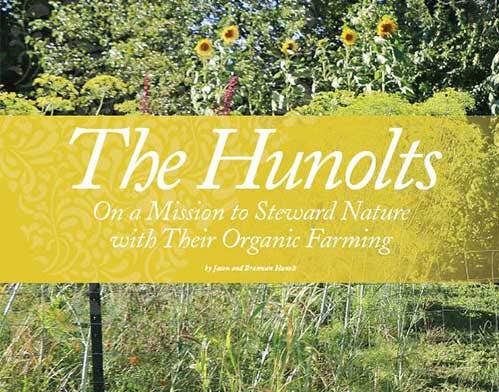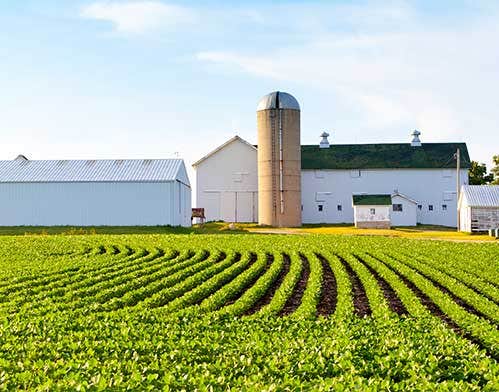The Hunolt Homestead Part 2 - Garden and Chickens
- 1/15/16

[vc_column css=".vc_custom_1501790800438{padding-right: 0px !important;padding-left: 0px !important;}"][vc_column_text el_id="text-content"]By Jason and Branwen Hunolt
The last eight months have been a fruitful learning experience as we strive to fulfill the romantic notions of what we would like to do on this land. In the short time that we have been here, we feel that we have done well hashing out a few of our ideas into reality. As we delve into the cold, short days of winter, we are provided with a quieter time to withdraw and dream of the next stage that we want to unfold. Future plans include Warre hive beekeeping, planting a hops yard and native fruiting hedgerows. We also plan to let our chickens reproduce if they go broody.
This past year was a whirlwind of activity from the moment we moved our belongings into the house. Amidst the chaos of boxes, packing papers, minor home improvements and adjusting to the surreal reality that we owned a home, we were faced with the ticking clock of a late start to getting seeds into the ground. We had to grit our teeth, ignore fatigue and get to work. In so doing, we managed to fence off a very large garden with rabbit fencing, plant it, build a gate, build trellises, raise baby chicks and build a hen house.[vc_single_image image="10894" img_size="large" add_caption="yes" alignment="center" onclick="link_image"][vc_column_text]But homesteading is a lifestyle. It’s not just about responsibilities, but is pursued out of the desire to be as self-sufficient and proficiently skilled as possible in caring for yourself, your family and the earth. Those who are drawn to homesteading tend to be people who want to work with the earth, practice organic living or just generally want to live a healthier lifestyle. Many realize the adage, “If you want it done right, do it yourself.” still rings true. Even a tiny garden is a victory for earth stewardship and personal health.
Many people might think that homesteading is too much work due to the overwhelming responsibilities. It takes discipline and effort. Ironically, our society often lacks such fortitude due to the mass production of all of our goods. But without discipline and responsibilities, we flounder. We get depressed, bored or seek to fill the void with empty entertainment that doesn’t improve our lifestyle or I.Q. Our family, however, desires to master and embrace the responsibilities. We want to take joy in learning to become more disciplined people, to enjoy the fact that we have the opportunity to affect and heal a small piece of earth while getting back to our life-sustaining roots. We want to do our part in fulfilling our responsibilities in the relationship between ourselves and Earth.
We’ve observed that it’s no wonder our modern biomes are meager compared to those from hunting, foraging and traditional agricultural societies. The truth is that our bodies actually evolved with and depend on the microflora of those lifestyles. But we lack that today and our mental and physical health suffers for it because our DNA and digestion both remember and are coded to respond best to these activities and to the microbes on the earth. Our bodies, minds and hearts find great fulfillment in them. It is no surprise, then, that getting back to nature is relaxing and beneficial to our bodies and moods. We are hard-wired for nature, despite our collective shift away from nature.
The bottom line is that we are inseparable from nature, no matter how we may act or think otherwise, and we have learned that up close and personal.
So, we want to share with you some of the principles we learned—or had to re-learn—as we deepened our relationship with Mother Nature:[vc_single_image image="10905" img_size="medium" alignment="center"][vc_column_text]We have to do the work, and the work doesn’t stop once the seeds are in the ground.
[vc_single_image image="10893" img_size="medium" add_caption="yes" alignment="center" onclick="link_image"][vc_column_text]We could go on endlessly, but we won’t, so we will leave you with two takeaways. One is that a personal application of will is the essential ingredient to your sense of success. Like people, some crops or creatures need little care, while others need a lot of love, but you will always know what sort of effort you cared to exert. In the end, your satisfaction is with your own effort and that alone. There’s one caveat with this: while you can control what you do, you can’t control the weather!
The second takeaway is that the viability of the gardening process (getting that “green thumb”) simply requires opening your heart and mind, allowing for the appreciation, inspiration and understanding of what you observe while working with nature.
Finally, while the first fruits of any planted crops is joyful, there may be nothing more fun and exciting than finding the first egg laid by one of your hens, which happened the day before Thanksgiving. Branwen really felt a flutter in her heart when she found it and she giggled as she ran all the way back into the house, while clutching it in her hand.
We all were in awe of this wonder of nature, though.
We have much to be thankful for. Even if there are some dark days, we believe that gratitude—and fortitude—can grow the greenest of gardens.[vc_row el_class="articles-carousel"][vc_column][vc_column_text]
The last eight months have been a fruitful learning experience as we strive to fulfill the romantic notions of what we would like to do on this land. In the short time that we have been here, we feel that we have done well hashing out a few of our ideas into reality. As we delve into the cold, short days of winter, we are provided with a quieter time to withdraw and dream of the next stage that we want to unfold. Future plans include Warre hive beekeeping, planting a hops yard and native fruiting hedgerows. We also plan to let our chickens reproduce if they go broody.
This past year was a whirlwind of activity from the moment we moved our belongings into the house. Amidst the chaos of boxes, packing papers, minor home improvements and adjusting to the surreal reality that we owned a home, we were faced with the ticking clock of a late start to getting seeds into the ground. We had to grit our teeth, ignore fatigue and get to work. In so doing, we managed to fence off a very large garden with rabbit fencing, plant it, build a gate, build trellises, raise baby chicks and build a hen house.[vc_single_image image="10894" img_size="large" add_caption="yes" alignment="center" onclick="link_image"][vc_column_text]But homesteading is a lifestyle. It’s not just about responsibilities, but is pursued out of the desire to be as self-sufficient and proficiently skilled as possible in caring for yourself, your family and the earth. Those who are drawn to homesteading tend to be people who want to work with the earth, practice organic living or just generally want to live a healthier lifestyle. Many realize the adage, “If you want it done right, do it yourself.” still rings true. Even a tiny garden is a victory for earth stewardship and personal health.
Many people might think that homesteading is too much work due to the overwhelming responsibilities. It takes discipline and effort. Ironically, our society often lacks such fortitude due to the mass production of all of our goods. But without discipline and responsibilities, we flounder. We get depressed, bored or seek to fill the void with empty entertainment that doesn’t improve our lifestyle or I.Q. Our family, however, desires to master and embrace the responsibilities. We want to take joy in learning to become more disciplined people, to enjoy the fact that we have the opportunity to affect and heal a small piece of earth while getting back to our life-sustaining roots. We want to do our part in fulfilling our responsibilities in the relationship between ourselves and Earth.
We’ve observed that it’s no wonder our modern biomes are meager compared to those from hunting, foraging and traditional agricultural societies. The truth is that our bodies actually evolved with and depend on the microflora of those lifestyles. But we lack that today and our mental and physical health suffers for it because our DNA and digestion both remember and are coded to respond best to these activities and to the microbes on the earth. Our bodies, minds and hearts find great fulfillment in them. It is no surprise, then, that getting back to nature is relaxing and beneficial to our bodies and moods. We are hard-wired for nature, despite our collective shift away from nature.
The bottom line is that we are inseparable from nature, no matter how we may act or think otherwise, and we have learned that up close and personal.
So, we want to share with you some of the principles we learned—or had to re-learn—as we deepened our relationship with Mother Nature:[vc_single_image image="10905" img_size="medium" alignment="center"][vc_column_text]We have to do the work, and the work doesn’t stop once the seeds are in the ground.
- An adjustment of lifestyle is needed to accomplish your goals and ideals, which requires discipline—meaning rising and shining early; picking crops before the heat of the day; checking for pests frequently; or even stopping playing that video game in which you’re a warrior—to become one in real life!
- Planning, rhythm, structure, discipline and determination are the building blocks upon which success is built.
- A long span of observation is necessary to understand your micro-ecosystems through Nature’s flux.
- Beware of predators—from insects to raptors; mammals, both burrowing and ground foragers; blights and disease—or even too much, or too little of any one commodity (e.g. sun, rain and certain plants).
- Working with wind, water retention, sunlight, flow is essential to happy crops.
- Building soil and maintaining proper nutrients must be a priority.
- Implement systems that allow for beneficial life forms (e.g. bee hives or hotels, hedgerows for birds and insects).
- Have patience, as “weeds” and pests are typically the worst in the first year; natural predators become more established the second year.
- Grass is not the end of the garden, but it does compete for nutrients.
- Be ready and able to preserve excess harvest before it spoils (e.g. via canning, drying or lacto- fermentation, etc.).
- Allow a good portion of the healthiest of your heirloom crop to go to seed, then harvest and store the seed.
- Be aware of cross pollination if you are saving seed. If you like new breeds and surprises, this can be fun. Otherwise, be forewarned that closely related species planted near to each other will cross-pollinate.
[vc_single_image image="10893" img_size="medium" add_caption="yes" alignment="center" onclick="link_image"][vc_column_text]We could go on endlessly, but we won’t, so we will leave you with two takeaways. One is that a personal application of will is the essential ingredient to your sense of success. Like people, some crops or creatures need little care, while others need a lot of love, but you will always know what sort of effort you cared to exert. In the end, your satisfaction is with your own effort and that alone. There’s one caveat with this: while you can control what you do, you can’t control the weather!
The second takeaway is that the viability of the gardening process (getting that “green thumb”) simply requires opening your heart and mind, allowing for the appreciation, inspiration and understanding of what you observe while working with nature.
Finally, while the first fruits of any planted crops is joyful, there may be nothing more fun and exciting than finding the first egg laid by one of your hens, which happened the day before Thanksgiving. Branwen really felt a flutter in her heart when she found it and she giggled as she ran all the way back into the house, while clutching it in her hand.
We all were in awe of this wonder of nature, though.
We have much to be thankful for. Even if there are some dark days, we believe that gratitude—and fortitude—can grow the greenest of gardens.[vc_row el_class="articles-carousel"][vc_column][vc_column_text]
THE HUNOLT FAMILY HOMESTEAD
On a Mission to Steward Nature with Their Organic Farming.




